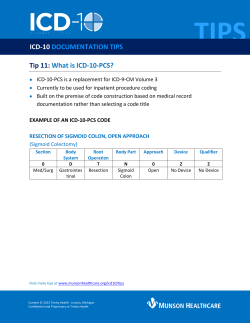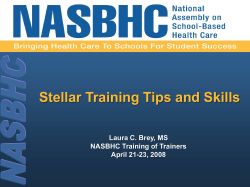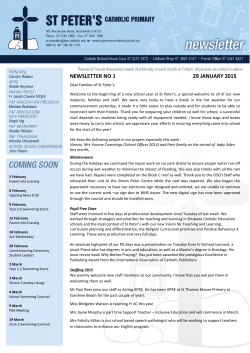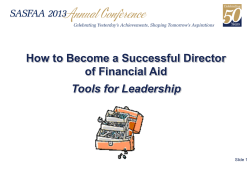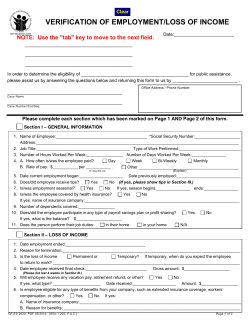
How to Be a More Successful Community Manager Thursday, May 15
How to Be a More Successful Community Manager Thursday, May 15 8 – 9 AM Presenter(s): T. Peter Kristian, CMCA, LSM, PCAM Fair Use: Copyrighted materials used by a presenter onsite during an educational session fall within Fair Use parameters. However, CAI Press sells the Annual Conference Resource Guide CD online in its bookstore, which is not an educational venue. Therefore, CAI will remove copyrighted materials—including individual slides from PowerPoint presentations—before creating the Annual Conference Resource Guide CD, unless the presenter provides CAI with written permission from the copyright holder. ISBN 978-1-59681-073-4 Conference Resource Guide 2014 © 2014 Community Associations Institute 6402 Arlington Blvd., Ste 500 Falls Church, VA 22042 Speakers/authors are solely responsible for obtaining all necessary permissions or licenses from any persons or organizations whose materials are included or used in their presentations and/or contributed to this work. This publication is designed to provide accurate and authoritative information in regard to the subject matter covered. It is sold with the understanding that the publisher is not engaged in rendering legal, accounting, or other professional services. If legal advice or other expert assistance is required, the services of a competent professional should be sought.—From a Declaration of Principles, jointly adopted by a Committee of the American Bar Association and a Committee of Publishers All rights reserved. 5/5/2014 Keys to Being a More Successful Manager T. Peter Kristian CMCA, LSM, PCAM May 2014 Keys to Being a More Successful Manager Control/ Influence your Environment and Expectations Embrace the Future - What do I do well and how can I create value in my job? Have a Plan or a Strategy - Find someone who is more successful than you. Surround yourself with successful people. 1 1 5/5/2014 Keys to Being a More Successful Manager Always Execute - Do what you say you are going to do, when you said you were going to do it. Communicate! Be impeccable with your word to others and to yourself. Be bold and audacious - Lead. Do you have “Grit”? 2 Keys to Being a More Successful Manager Create value - Three elements that intersect - Demand for what you do, Ability to do the job, and Difficulty in replacing you. Constant improvement of what you are offering – Continuing Education - Invest in yourself People don’t buy What you do they buy Why you do it. What, How and Why proposition Give back to the community and your profession 3 2 5/5/2014 Organizational Values Respect Each Other Provide Exceptional Customer Service Constantly Strive for Excellence 4 Always Look Ahead – but Learn from the Past If you feel your organization is successful today, think back five years and ask yourself what was done then to make your organization successful today. 5 3 5/5/2014 Shared Purpose Do you and all of your employees understand and believe in your Brand? Why you do it. What is your promise to your residents? How do we deliver on that promise? Does your Organization have a Culture of Trust? Kinds of Trust Reciprocal Trust - Trust that each member of the staff will do their job Representation Trust – Our advisors will give us sound advice Lawyers, CPAs, Engineers, Vendors, etc. Trust the members have in you and the Board Counterfeit Trust - Mob Bosses 7 4 5/5/2014 Traits of a Quality Organization Integrity of the Leader - both personal and private – Leadership Mutual Respect - The individual is more important - How do you treat the powerless (receptionist, custodial staff)? Are Employees empowered? Power aligned with responsibility Your organizational vision is communicated There is shared sacrifice 8 Traits of a Quality Organization (cont’d.) Tells the truth about the status of the organization (good news and bad) Budgets are shared Conflict - Do we accept criticism for what can we do better? Humility - Share your weaknesses - Don’t sugarcoat everything Look over the horizon for the next issue or innovation - Does it make us the best? 9 5 5/5/2014 Some Things to Look for in an Employee Competent in their job and gets the job completed in a timely manner (ability to deliver) Provides Excellent Customer Service - Goes the extra mile for a customer or a co-worker On Time, Gritty, Honest, and Truthful Is dressed for the tasks they are assigned Tells me like it is, not what I want to hear (broccoli feedback) 10 Some Things to Look for in an Employee (cont’d.) Fun to be around Does what is right because it is right and not because someone is watching (Eddie Haskell syndrome) Looks for ideas that save money or improves efficiency Respects both customers and co-workers Problem Solver Is cool under pressure and looks you in the eye Provides a unique perspective 10 6 5/5/2014 Bill Gates - on Life Modified Rule 1: Life isn’t fair - get used to it Rule 2: Your Board, residents, and co-workers, for the most part, don't care about your self-esteem. They expect you to accomplish something BEFORE you feel good about yourself. Rule 3: You will NOT make $100,000 in your first year as a community manager. You won't be a vice-president with a company car until you have earned both. Rule 4: If you think your boss is tough, wait until you get in front of a group of angry residents at a board meeting. 11 Bill Gates - on Life Modified (cont’d.) Rule 5: Mundane tasks are not beneath your dignity. Those above your pay grade had a different word for those activities – they were called gaining experience, OJT, and paying your dues. Rule 6: If you mess up, it's not someone else’s fault, so don't whine about your mistakes, learn from them. 11 7 5/5/2014 Bill Gates - on Life Modified (cont’d.) Rule 7: Before you became a community manager, your supervisor wasn’t as boring, uncaring, and unwilling to try every idea that popped into the heads of the staff under their supervision. They got that way from working with new community managers who all felt they knew everything. So before you pontificate on your philosophy of how to run the company or the community you are privileged to manage, try listening and learning for the first six months before you put your foot in your mouth with your brilliant ideas. 12 Bill Gates - on Life Modified (cont’d.) Rule 8: In your mind, you may have done away with winners and losers, but life HAS NOT. In some schools, they have even abolished failing grades and they'll give you as MANY TIMES as you want to get the right answer. This doesn't bear the slightest resemblance to how a community association is expected to operate. 12 8 5/5/2014 Bill Gates - on Life Modified (cont’d.) Rule 9: Life is not divided into your vacation periods, your coffee breaks, or revolve around your personal text messages, checking your social media accounts, or tweets. You are being paid to do actual work. You don't get time off until you have earned it and few employers are interested in helping you FIND YOURSELF or that your best GF has found new love. Do that on your own time. Rule 10: Reality Shows are NOT real life. In real life people actually have to get up in the morning and go to jobs. 13 Bill Gates - on Life Modified (cont’d.) Rule 11: Be nice to your supervisor. If you are successful, you will be one someday and expect your subordinates to respect, take direction, and your advice just like your present supervisor expects those things from you. 13 9 5/5/2014 Human Resources Hire for Value and Belief in what you do. Let individuals go for lack of congruence with company values. 14 Customer Service The member is the most important person in our business. The member is not dependent upon us; we depend on him/her. The member is not an interruption of our work, but the purpose of it. (Ten Foot Rule - If you are within ten feet of a resident, greet them and ask how they are doing.) 15 10 5/5/2014 Customer Service (cont’d.) The member does us an honor when he/she calls; we are not doing him or her a favor by serving them. The member is part of our business, not an outsider; the member is our guest. The member is a human being with feelings and emotions like our own. The member is not someone with whom to argue or match wits. The member deserves the most courteous and attentive treatment we can provide. 16 Customer Service We are Ladies Gentlemen. and Gentlemen (cont’d.) serving Ladies and The value a member places on their community can be measured in many ways. One of the easiest is to ask your members this question: If a buyer were to offer fair market value for your home right now, would you choose to move or stay? 17 11 5/5/2014 Peter’s Tips Weekly Department Head Staff meetings - give all the opportunity to speak Communicate with all Staff members Do performance reviews on time Walk the talk Greet the members at all meetings personally Answer mail and email promptly Compliment publically and discipline privately Control expectations 18 Peter’s Tips (cont’d.) Open a “positive bank account” with all of your staff members. Back your staff when they are right. Do what you say, when you said you were going to do it. Be a coach - give your staff “broccoli feedback”. Visit with your co-workers and call them by name. Take responsibility when things fall short. 19 12 5/5/2014 Peter’s Tips (cont’d.) Give everyone in your organization credit when you have a success. Reward/recognize lateral service. Survey your members Interview potential Committee and Board members. Focus on building community. Your job is to make the Board look good. People don’t buy what you do - they buy why you do it. 20 Peter’s Tips (cont’d.) It’s not personal – “Road House” Train your Board Members - 50 mile rule Network with your colleagues Be polite until it hurts and kill them with kindness Communicate - newsletter, email, etc. Decide to be successful Take action Delay gratification for long-term benefit Incremental Improvement - just a little each day adds up 21 13 5/5/2014 Peter’s Tips (cont’d.) Recognize Staff and Volunteers Take care of yourself health-wise, both physical and mental Get up early and read something that is going to improve or enlighten you. After every telephone call or meeting, debrief yourself. What did you do right? What would you do differently next time? Make a list and prioritize each item 22 Peter’s Tips (cont’d.) Website - three main objectives - Timely information 24/7 to the residents - Reduce the need to answer routine questions and provide routine documents - To market the community Community Bulletin Board - Must be topical and updated frequently 23 14 5/5/2014 18 Peter’s Tips (cont’d.) Board makes policy and the Community Manager implements that policy. Keep your Board “out of the weeds” and keep them focused on the BIG picture, not the kind of flowers to be planted at the entrance feature. Establish clear lines of your spending authority as Community Manager. Committees are advisory unless specifically authorized by the Board to make certain determinations, or they are vested with a responsibility through the association’s governing documents. 24 15 5/5/2014 Peter’s Tips (cont’d.) There are people in positions of leadership, and then there are those that lead. Community Managers who are leaders manage their communities. “Expect staff to provide you with solutions.” - General Patton. People are inspired by “Why you Do It”, not “What you Do”. They are inspired by “What you Believe” because it touches something they also believe. Your Belief - We want your Community to be the “Best” in its class. 25 Peter’s Tips (cont’d.) Live by your Code of Ethics Recent issuesDisclose all conflicts - real and potential Don’t bad mouth your competition Be a good steward of other people’s assets Don’t take sides on board elections Correct any mistakes promptly Records belong to the client Do not display cronyism When properly requested, provide appropriate association records 26 16 5/5/2014 Grit in psychology is a positive, non-cognitive trait based on an individual’s passion for a particular long-term goal or end-state coupled with a powerful motivation to achieve their respective objective. This perseverance of effort promotes the overcoming of obstacles or challenges that lie within a “gritty” individual’s path to accomplishment and serves as a driving force in achievement realization. Questions ? 27 17
© Copyright 2025







